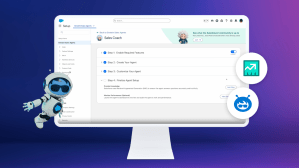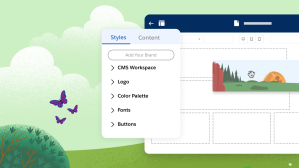Almost overnight, every field sales rep suddenly became an inside sales rep, relying on phone calls and Zoom presentations instead of in-person meetings and on-site demos. Whether you’re a sales rep at a company like 3M that has seen a massive and sudden spike in demand, or TentCraft, that has created new offerings tailored to the current climate, there are plenty of challenges and barriers to selling remotely.
Having technology that enables your sales teams to sell remotely and allow sales managers to still get insights into those conversations is critical to a company’s resiliency right now. But what comes next? As remote work continues and companies aim to adapt, sales leaders need to keep employees engaged with remote coaching — providing personalized feedback for career growth and sales efficiency, as well as insights on trends that the company can use to improve talk tracks and training programs. You can’t afford to lose deals because a rep is not trained on a tough pricing question.
Einstein Call Coaching, a feature of High Velocity Sales that is now generally available today, brings conversational intelligence into Salesforce to have more relevant conversations and increase win rate thanks to AI: It helps sales teams gain visibility into sales reps’ customer interactions and accelerate onboarding, enablement and continued success by sharing business insights and best practices.
A Colorado-based company, Armstrong Steel, sells and manufactures metal buildings like sheds and garages, and has made major shifts and improvements to their training processes across the company. “At Armstrong Steel Buildings, we’re in the business of selling a complex product — not everyone knows the ins and outs of metal buildings,“ said Ethan Chumley, CEO, Armstrong Steel. ”Salesforce’s Einstein Call Coaching helps us better train our reps on the most relevant topics our customers care about, which leads to a better buying experience for our customers.“
We spoke to Sean Andrews, Salesforce Developer at Armstrong Steel to hear how Einstein Call Coaching helped their sales team make better sales calls, saving time and money thanks to a new level of accuracy in their sales conversations.
Q. How does your team use Einstein Call Coaching?
We use Einstein Call Coaching throughout the entire company, not just for initial sales calls. For our direct sales team, we have a three-call structure that includes confirming the lead information, understanding what a customer is looking for in a building, and then closing the deal. From there, the customer moves on to project management, where we help design extra features of the building and customize it with features like gutters to windows. Then, we handle the delivery logistics and post-delivery calls to align on delivery timing, and to ensure that the customer is satisfied after the building is delivered.
We use Einstein Call Coaching in each of these steps, so we can listen to and get a better understanding of the entire lifecycle of a customer within Salesforce. We also go over all the calls once a building is completed to check for errors, or what we call mis-reps, and for training purposes.

Q. How did you manage training and call insights before Einstein Call Coaching?
Previously, we would spend hours each week pulling up a random selection of recordings, listening to as many as we needed in order to find the best ones for training purposes. With thousands of calls a week, there was no easy way to understand what was happening on these calls, and this manual process was not a productive use of time. If we wanted to get a better understanding of conversations on a specific product, we would have to ask reps when they last remember speaking about a certain building feature, and then try to narrow down on the date of the call.
With the ability to easily see how long calls are, who is talking, and the keywords in them, Einstein Call Coaching makes this process much more efficient. We get an email every day that shows the top recommended calls for us to listen to, but we can also see trending keywords. We get insights on what topics are coming up more frequently and can get ahead of those things. Our sales managers have reduced the number of calls they listen to by 40% and reduced the time spent listening to calls by 60%.

Q. What kind of keywords are you tracking now?
The main keywords being tracked are competitors, types of buildings being mentioned, specific design options being requested, and misrepresentations. The first three categories help us understand what competitors we are facing most often, and what type of building designs and options are trending. For example, there are some design features that we used to get asked about once for every thousand calls, and now it’s more like one in fifty calls — so that helps us make adjustments to our business and offerings we might not have realized we needed.
Misrepresentations are tracked for training purposes, as well as to avoid issues of promising the customer something we cannot offer.

Q. Have you changed any business processes due to Einstein Call Coaching?
The coaching process is much more efficient now. With keyword tracking, we are able to catch common misrepresentations almost immediately and handle them appropriately, as opposed to finding mistakes further in the process after the customer has already made a purchase. We’ve already caught several misrepresentations before they became an issue, saving us potentially tens of thousands of dollars.
We’ve also noticed trends of common mistakes and concepts that sales reps struggle with, so it’s easier to orient our trainings around these topics now. We expect misrepresentations to decline by 40-50% over time and save at least $100,000 as we continue to modify our training and coaching practices. It has also given us the ability to coach a rep on a specific topic, say a seamed roof, and then follow up days or weeks later and listen to new calls that mention a seamed roof to see how they have progressed.
Q. Do you think Einstein Call Coaching has improved the customer experience?
Yes, as we are seeing trends in the types of options and customizations that customers are requesting most often, we are able to focus more time training the sales reps on those buildings designs. It speeds up the sales process because we’re getting the correct information to the customer right away, rather than possibly giving them incorrect information or having to follow up later. It also means reps can get a deeper understanding on the topics that are most important to customers, rather than training them widely on topics they may not ever encounter.
Q. How has your team responded to the new technology?
Managers love the dashboard views so they see everything from trending keywords to insights on their team at a glance. Overall I feel that the sales reps appreciate the improvement in our training process. Being able to orient the training around what our customers are bringing up most often, they feel that the value of the training is more useful, and they are better equipped to handle customers’ questions.
















